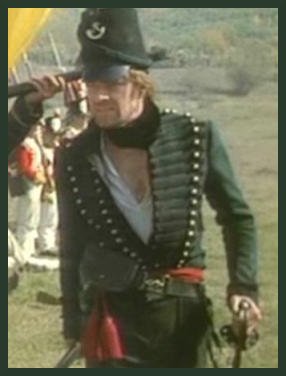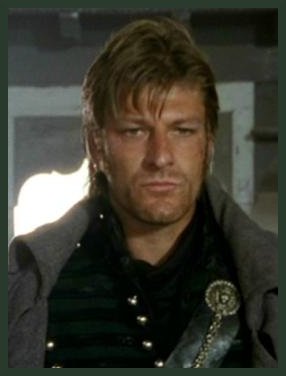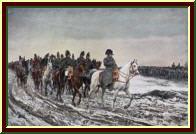Sharpe's Miracles: Fact or Fiction?
When reading about favourite characters we always tend to overlook the fact that they are supposed to be ordinary people, flesh and blood, like we all are. It's the same when watching a movie. Of course we know that the things that happen to our protagonists sometimes stretch our imaginations a little, something most of us don't have any problems with, but at times things happen in books or films which even the most gullible person can't get his head around. This also holds good for Sharpe. If all the things on this page had really happened to him, he would certainly be a superhero. Was he? Or was he just the kind of soldier Napoleon preferred to have at his side: lucky?
- When Sharpe's bullet wound brings on a fever in Honour, Helene
miraculously restores full health to him with a hand clasp and a kiss. After
which, he is restored well enough to find the answers to the shennanigans
which Harper relays to Nairn by informing him that "he was at her all night,
Sir." Conclusion: Sharpe really knows how to play up a minor flesh wound to
garner sympathy and personal attention from a lady.

- The impression is given that Sharpe has sex with
Lass in Sword and it miraculously restores her
power of speech. Conclusion: Sharpe afficionados are divided on the point
that Sharpe actually had sex with Lass. And since there is no real evidence
other than wishful thinking to make it so, it is highly doubtful that it
happened. Afterall, he had to save what little strength he had so he could lead a battle and have a sword fight later that same day. Even Sharpe has his limits!
- The morning after Lt. Berry shoots him in the
leg on night patrol, Sharpe runs off to capture the eagle without a limp.
Conclusion: It was just a graze afterall, so other than smarting a bit, it may
not have impaired his mobility. Also, Wellington's forces were gathered near Talavera
for nearly two weeks leading up to the battle and no indication was made as
to exactly what night the wounding took place. Skirmishes and casualties were a nightly
occurrance. He certainly wasn't feeling too bad to have a roll in the hay with
Teresa the night before the battle.
- It appears that within hours after Wellesley's victory at Talavera, Josefina
informs Sharpe that he's been made Lord Wellington. Conclusion: The boats
between England and Spain must miraculously sail at the speed of light. Point in fact: there was an efficient courier service and a carrier pigeon service in place between Lisbon and London as well as a semaphore system. On top of that set of facst is that the Battle of Talavera actually took place over two days. Also, by the time Sharpe would
have gone from being wounded on the battlefield, seen the surgeon, and then been evacuated with the other wounded during Wellington's hasty retreat from Talavera back into Portugal, several days may have passed by the time that
Josephina and Captain Leroy could have caught up with him. Leroy, as the senior surviving officer next to the newly-appointed Lt. Colonel Lawford, would have had many responsibilities to deal with before he would have had the opportunity to visit any of the wounded moved to the field hospital.
- Wagon Master General Runcimun was made Baron only one day after the Compania
Real Irlandesa had proven itself against Brigadier Loup. Conclusion: the American
newspapers recounting the British horrors against Irish citizenry did actually
make it in a clipper across the Atlantic in a single day. Again, it should
be noted that the British had a well-established communications system and the passage of time was not clearly accounted for. It would have taken several days, if not weeks, for the Alona fort to have a garrison emplaced so that the Compania Erlandesa could have pulled out to rejoin the main force and so that Sharpe could present his full report to Wellington. It would also have taken Lady Kiely some time to organize her transportation back to wherever it was she came from.
- When Sharpe is being beaten up by Ducos in Honour,
he is still limping from a bullet wound received the day prior from the partisans. But, by the time he returns to Wellington's headquarters just in time for the Battle of Vittoria
a short time later, he's miraculously running across snowy landscapes and
leaping over barricades without any sign of injury. Conclusion: there is absolutely
NO explanation for this one. Must have been the numbing effect of the cold winter weather.
- After being killed in Company while defending Teresa,
Harry Price miraculously shows up alive and well
in Waterloo. Conclusion: If Sharpe can survive a musket ball to the gut in
Sword, certainly a measly little pistol ball couldn't kill Harry in Company.
- Sergeant Harper has been shot only 4 times--in Rifles, Enemy, Honour and Gold--and
each time with only a scratch to the left shoulder, miraculously leaving his
right arm healthy for more fighting. Conclusion: Harper is a jammy bastard
or else the Frogs were shaking from the sight of the big guy that they couldn't
aim any better.
- When Sharpe returns the green jackets to his men in Company, their white
pants miraculously turn green as well. Rational Explanation: Typical of military
operations, there was a lot of stand-around-and-wait time between the occasion
of the return of the jackets and the time the soldiers formed up for the assault
during which the soldiers would have been allowed to attend to last minute
details, permitting the Chosen Men plenty of opportunity to change their trousers.

- When Sharpe reports to Wellington that the breach at Badajoz is practicable,
he's limping as a result of Hakeswill's assassination attempt. But when he storms
the breach that night, he miraculously climbs up the steep slope, stepping
over dead bodies and through pools of blood without any limp at all. Conclusion:
The actual timeline of the siege covers a longer period. When he pronounced on the
breaches, he had been laying up on the glacis the whole night, very damp and
cold during a frigid period of weather and it is likely anyone who had had any sort of leg problem would have
been limping that morning. Surely the adrenaline in the moment he launched himself at the breach would have overridden any aches or pains he might have had. Besides, the pistol wound had happened the night that the
engineers actually did attempt to blow the dam, a real event that occurred
several weeks before the actual assault -- plenty of time for a hardy soldier
like Sharpe to recover.
- Even though Sharpe has been injured in the right knee (Eagle), shot in the
left thigh (Eagle), slashed across the left arm (Eagle), shot in the left leg
(Company), shot in the right thigh (Honour), slashed across the stomach (Honour),
stabbed in the right arm (Gold), shot in the left arm (Battle), slashed in
the left shoulder (Sword), shot in the belly (Sword), nail-shot in the right
leg (Revenge), and stabbed in the left arm (Justice), miraculously the only
hole in Sharpe's uniform is in the left elbow, which was already there when
he first acquired it (Rifles). Conclusion: Coincidence? It was common practice
for soldiers, even officers, in the Penninsula to replace clothing by taking
that of deceased men. That is probably why his sash was changed several times
also. As for his trousers, they were French cavalry officer's overalls and
were made of tougher material than the regular trousers or breeches worn by
other officers and those, along with any hard-to-come-by uniform items, would have been carefully mended by one of the wives on strength.
- Even though Hakeswill steals Sharpe's Wellington-inscribed
telescope in Company, it miraculously shows up when Nairn
gives it to Sharpe in Honour. Rational Explanation: When Hakeswill so unceremoniously
departed Teresa's house, he left behind everything but his pike which he had
left by the gateway. Sharpe was therefore able to return Colonel Windham's
wife's portrait which was inside Hakeswill's shako as well as later reclaiming his telescope
from Hakeswill's pack which had been left with the rest of the regiment's packs before
the assault on Badajoz began.
- As soon as Sharpe suggests to Teresa that maybe they should get married,
she miraculously becomes his wife without benefit of a ceremony. Conclusion:
A matter of convenience combined with Sharpe's sense that she was already
his wife in spirit. He was more likely to be given more leeway in defending
her if everyone thought she was really his wife, plus it gave her more respectability
in the eyes of the righteous officers he had to deal with. In the book, they
were married by a priest the day after the fall of Badajoz.

- Sharpe leaves the eagle that he captured at Talavera at Major
Lennox's gravesite. But in Regiment, it miraculously shows up in London
when the Prince Regent presents it to Sharpe. Conclusion:
You don't really think Colonel Lawford or Wellington, ambitious men that they
were, would have allowed that eagle to sit there and rot or be stolen by some
partisans or looters?
- Every single jacket that Sharpe owns (except for the dress uniform he wears in
Regiment and Siege) miraculously has a hole in the left elbow. Even the leather jacket he wears in Honour! Conclusion: The man is death on his clothes or else very careless where he sticks his left elbow.
- In Gold [book] Sharpe is shot in the shoulder and nearly bleeds to
death. After having the wound cauterised and being taken to safety he is
miraculously still able to have sex with Teresa after bribing her with
the promise of a rifle. Conclusion: The man is simply a marvel of modern science or else he's just one very horny bastard.
- In Sword [film] Sharpe is shot in the side and left to die in a
dying room. After being found by Harper he is taken to Lass [The Nun]
who removes the bullet and sews him up. Miraculously, the next morning
he is up again [on his feet!]. Likewise, it takes Harper a solid week of forging the new sword. Conclusion: Meshing the script with the book, it actually takes weeks for him to recover enough to start moving around. Time is never completely accounted for while Sharpe is suffering from the fever and it isn't known exactly how long between the time the fever broke and he actually became conscious and lucid again. According to actual accounts, the process of reducing fever via hydrotherapy was not a one-shot process. The passage of time is implied rather than actual.






